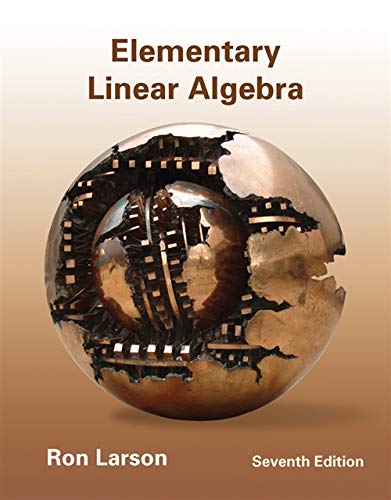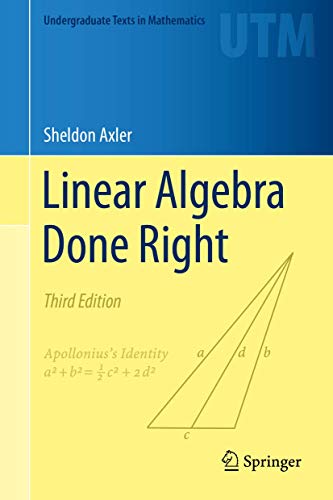Top products from r/3Blue1Brown
We found 12 product mentions on r/3Blue1Brown. We ranked the 10 resulting products by number of redditors who mentioned them. Here are the top 20.
1. Principles of Mathematical Analysis (International Series in Pure and Applied Mathematics)
Sentiment score: 0
Number of reviews: 1
McGraw-Hill Science Engineering Math
 Show Reddit reviews
Show Reddit reviews2. Visual Complex Analysis
Sentiment score: 1
Number of reviews: 1
Oxford University Press USA
 Show Reddit reviews
Show Reddit reviews3. Naive Lie Theory (Undergraduate Texts in Mathematics)
Sentiment score: 1
Number of reviews: 1
 Show Reddit reviews
Show Reddit reviews4. Complex Analysis: Stewart/Tall
Sentiment score: 0
Number of reviews: 1
Used Book in Good Condition
 Show Reddit reviews
Show Reddit reviews5. Mathematical Methods for Physics and Engineering: A Comprehensive Guide
Sentiment score: 1
Number of reviews: 1
Cambridge University Press
 Show Reddit reviews
Show Reddit reviews6. Coding the Matrix: Linear Algebra through Applications to Computer Science
Sentiment score: 1
Number of reviews: 1
 Show Reddit reviews
Show Reddit reviews8. Introduction to Linear Algebra, Fifth Edition (Gilbert Strang)
Sentiment score: 1
Number of reviews: 1
CAMBRIDGE UNIVERSITY PRESS
 Show Reddit reviews
Show Reddit reviews


A wonderful source for those that want to know questions better: Naive Lie Theory by John Stillwell
(Google excerpts)
This book is a wonderful read and it jumps into quaternions very early on. It really helps one learn about them and other spaces. Is also a remarkably Easy to access book on Lie Theory — (basic calculus, linear algebra only real read. Having seen group theory before is nice, but not necessary)
I’m about half way through and just love it.
Also, somewhat related, Visual Complex Analysis by Tristan Needham is a ridiculously good and powerful book.
(Google excerpts)
Anyone that has to interact with complex numbers should read at least the first two chapters in my opinion.
I can give you a counter-example. What book NOT to buy:
https://www.amazon.com/Elementary-Linear-Algebra-Ron-Larson/dp/1133110878
The introductory quote from the first linear algebra video from 3Blue1Brown is:
"There is hardly any theory which is more elementary than linear algebra, in spite of the fact that generations of professors and textbook writers have obscured its simplicity by preposterous calculations with matrices."
The textual abuse and systematic obfuscation of such simple concepts as linear algebra is perfectly captured in that textbook.
Browsing around I found this:
https://math.stackexchange.com/questions/160056/what-is-a-good-book-to-study-linear-algebra
and then this:
http://math.mit.edu/~gs/linearalgebra/
Which looks better. The problem with Linear Algebra is that it's taught by people with their heads stuck in the clouds in their crystal fortresses where they already know the problems, know the questions, know the procedures, and they've completely forgotten what it means to not know anything about linear algebra. So teaching it is reduced to repetitive procedure, endless transforming of matrices that might as well be these intricate recipes that turn unsatisfying mysterious symbols into other unsatisfying mysterious symbols.
It's a subject ripe for disruption, ready for a completely different approach where we go back to first principles where we go back to the reasons for why the people who created linear algebra did what they did, and then follow their footsteps. It's just math around lines. It's easy to get lost in the steps of the recipe that you don't see the point. That in this 3d realm there are imaginary things called lines, and we can perform mathematical operations on those lines in order to do things like for example figure out how to calculate distance between lens and object in view when all we know is distance between fovea and lens, and the angle and distance between edges on rods/cones.
The point of linear algebra is to reduce the miracle of complex things like rays of light, and how our eyes achieve vision into equations that can be processed by a computer so we can teach a computer to see like humans do. Light is just lines.
A book am using is Thomas Cala and it looks like a good book on it https://www.amazon.com/s?k=thomas%27+calculus+12th+edition&i=stripbooks&crid=348T2AR8JCUJA&sprefix=Thomas%27+Calculus+12%2Cstripbooks%2C187&ref=nb_sb_ss_i_1_19 .
Also try https://www.amazon.com/Mathematical-Methods-Physics-Engineering-Comprehensive/dp/0521679710/ref=pd_ybh_a_19?_encoding=UTF8&psc=1&refRID=AH70YHCXP3QJKG2560EF
Introduction to Linear Algebra by Gilbert Strang (https://www.amazon.com/Introduction-Linear-Algebra-Gilbert-Strang/dp/0980232775/)
(Quite good when taken along with the online course: https://www.youtube.com/playlist?list=PLE7DDD91010BC51F8)
I like the format in which they are written.
Try this..
https://www.amazon.com/Coding-Matrix-Algebra-Applications-Computer/dp/0615880991/ref=sr_1_1?ie=UTF8&qid=1497016470&sr=8-1&keywords=coding+the+matrix
It's an amazing book with programming in Python.
I found Axler's Linear Algebra Done Right to be a very easy to digest introduction to abstract linear algebra.
I've found Rudin's Analysis useful. There's a lecture series on YouTube that roughly follows the book.
A good book on Gödel's proof is Gödel's Proof.